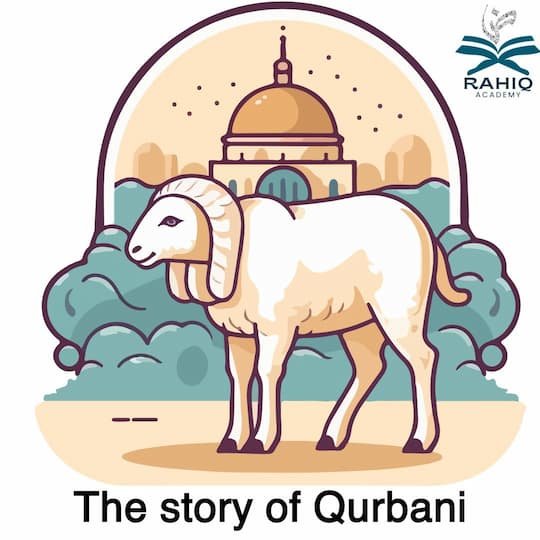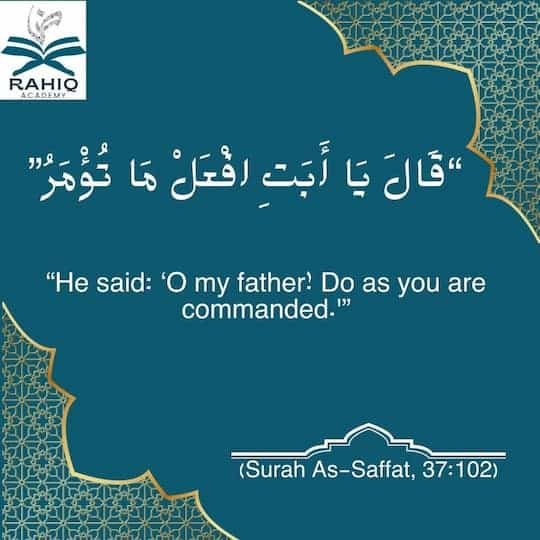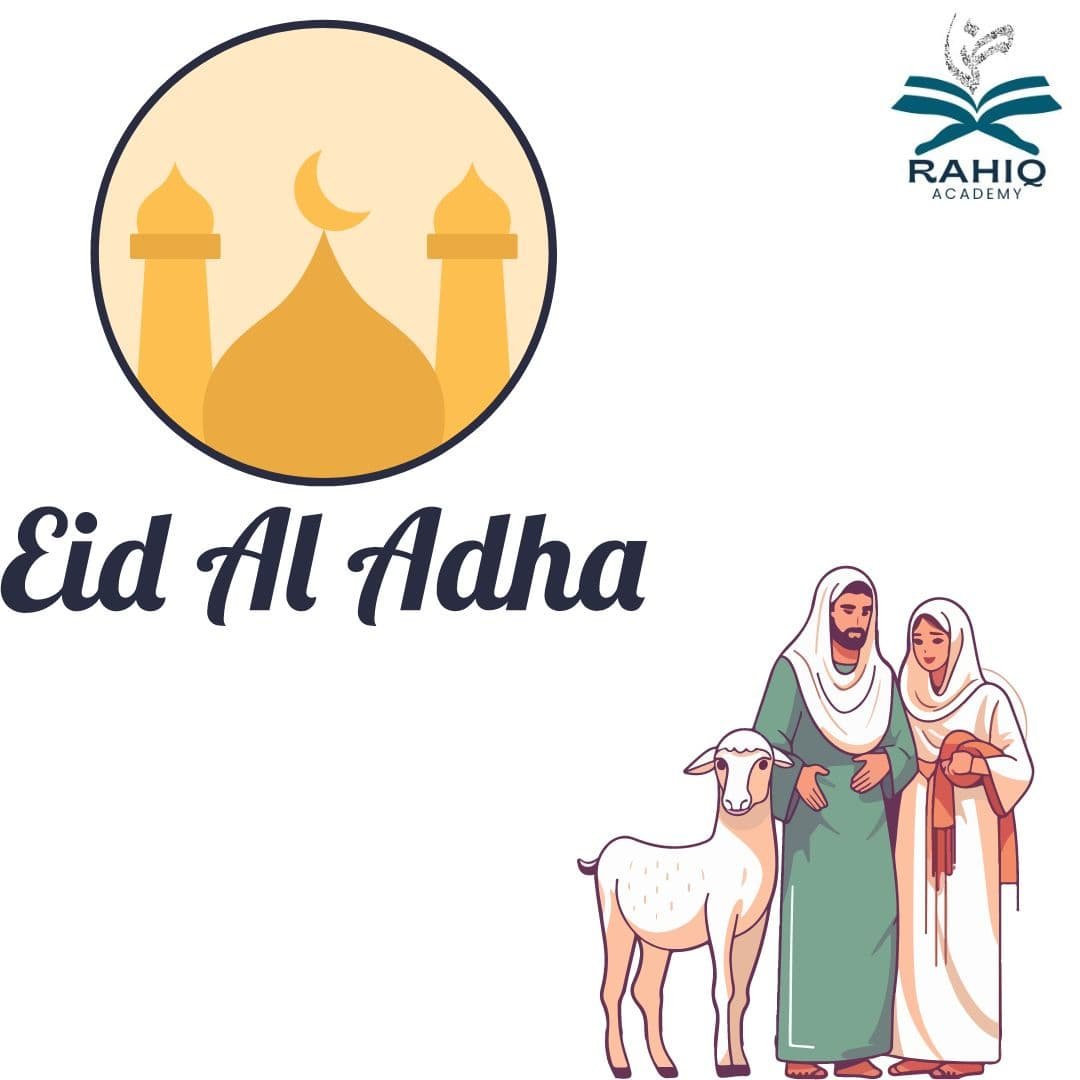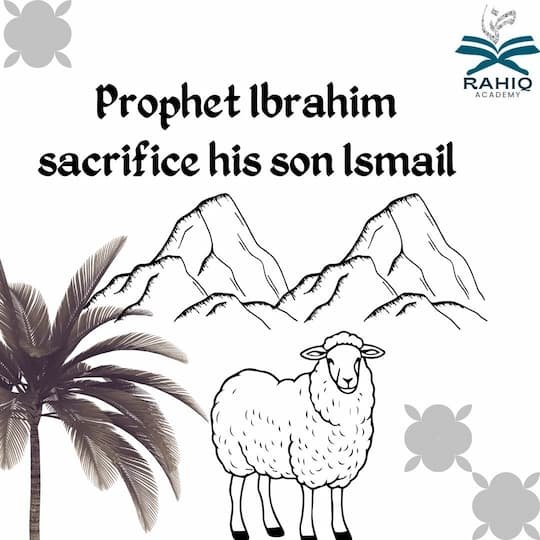Imagine a father’s heart, heavy with love yet trembling before a terrifying dream. Prophet Ibrahim sacrifice his son Ismail, the son he longed for and cherished. Doubt wrestles with devotion, but Ibrahim (AS) is no stranger to trials. Embark on a journey where love and faith collide, and witness a testament to complete surrender, a sacrifice that echoes through generations.
The story of Qurbani

The story of Qurbani tells of Prophet Ibrahim’s (AS) immense internal struggle. Torn between love for his son, Ismail (AS), and absolute devotion to God’s command, Ibrahim (AS) prepared to make the ultimate sacrifice, a testament to his unwavering faith.
The Command to Sacrifice Ismail
The story begins with Allah’s command to Prophet Ibrahim (AS) to sacrifice his beloved son Ismail (AS), as mentioned in the Qur’an:
وَإِذْ ابْتَلَىٰ إِبْرَاهِيمَ رَبُّهُ بِكَلِمَاتٍ فَأَتَمَّهُنَّ ۖ قَالَ إِنِّي جَاعِلُكَ لِلنَّاسِ إِمَامًا ۖ قَالَ وَمِن ذُرِّيَّتِي ۖ قَالَ لَا يَنَالُ عَهْدِي الظَّالِمِينَ
“And when his Lord tested Ibrahim with certain words, and he fulfilled them. He said, ‘I am making you a leader for mankind.’ Said he, ‘And from among my offspring?’ He said, ‘My covenant does not extend to the wrongdoers.'” (Surah Al-Baqarah, 2:124)
As quoted in the third article, the Qur’an clearly states that Ibrahim (AS) was commanded to sacrifice his son Ismail in a dream:
فَلَمَّا بَلَغَ مَعَهُ السَّعْيَ قَالَ يَا بُنَيَّ إِنِّي أَرَىٰ فِي الْمَنَامِ أَنِّي أَذْبَحُكَ فَانظُرْ مَاذَا تَرَىٰ ۚ قَالَ يَا أَبَتِ افْعَلْ مَا تُؤْمَرُ ۖ سَتَجِدُنِي إِن شَاءَ اللَّهُ مِنَ الصَّابِرِينَ
“Then when he reached the age of striving with him, he said: ‘O my son! I have seen in a dream that I sacrifice you, so consider what you see.’ He said: ‘O my father! Do as you are commanded; you will find me, if Allah wills, of the patient ones.'” (Surah As-Saffat, 37:102)
Ibrahim’s Internal Struggle
Understandably, this divine instruction caused great internal turmoil for the prophet, who had longingly awaited the birth of Ismail after decades of being childless. The first article describes Ibrahim’s (AS) difficulty in coming to terms with sacrificing his only son:
“How can one describe Ibrahim’s fear by the shock of this message? Even if we were there as witnesses, we couldn’t feel it. The degree of his pain is beyond tolerance or imagination! Ibrahim, the most humble servant of God and the famous rebel of human history, started to shake as if he were falling apart and the great invincible of history was breaking to pieces.”
Facing an unimaginable test from Allah, Ibrahim (AS) wavered temporarily as described in the fourth article:
“Satan tried again: ‘But I hear this message in my dream; how could it be real?’ And this was the second time he refused to sacrifice his son.”
However, the Prophet’s unwavering faith and devotion to Allah eventually overcame his personal reservations, as the Qur’an states:
“فَلَمَّا أَسْلَمَا وَتَلَّهُ لِلْجَبِينِ”
“And when they had both submitted and he put him down upon his forehead.” (Surah As-Saffat, 37:103)
The Dialogue Between Father and Son

After resolving to follow Allah’s command, Ibrahim (AS) engaged his son Ismail (AS) in a poignant conversation regarding the sacrifice, as vividly depicted in the fifth article:
“In Mina, in a quiet corner, Ibrahim talked to his son!At first, Ibrahim was unable to open his mouth to repeat the story to his son – ‘I am here to sacrifice you with my hands’.
Finally, he put himself in God’s trust and said, ‘Ismail, I had a dream I was slaughtering you!'”
Ismail’s response, mentioned in the Qur’an earlier, was one of complete submission:
“قَالَ يَا أَبَتِ افْعَلْ مَا تُؤْمَرُ”
“He said: ‘O my father! Do as you are commanded.'”
(Surah As-Saffat, 37:102)
The fifth article adds more context to this incredible display of faith:
“Ismail, the brave man who accepted Allah’s will, was so relaxed and quiet, as if nothing was going to happen. Ibrahim, the true lover of Allah, first destroyed his selfish feelings and relied only on Him.”
The Sacrifice Averted
Just as Ibrahim (AS) was about to sacrifice his son, Allah intervened and replaced Ismail with a ram, as mentioned in the Qur’an:
“وَنَادَيْنَاهُ أَنْ يَا إِبْرَاهِيمُ . قَدْ صَدَّقْتَ الرُّؤْيَا ۚ إِنَّا كَذَٰلِكَ نَجْزِي الْمُحْسِنِينَ”
“And We called out to him: ‘O Ibrahim! You have fulfilled the vision.’ Indeed, We thus reward the virtuous.” (Surah As-Saffat, 37:104-105)
“وَفَدَيْنَاهُ بِذِبْحٍ عَظِيمٍ”
“And We ransomed him with a great sacrifice.”
(Surah As-Saffat, 37:107)
The fourth article explains this turn of events:
“Before Ibrahim touched him again, a sheep suddenly appeared with a message – ‘Oh Ibrahim, God does not want you to sacrifice Ismail. This sheep is sent to you as his ransom. You have carried out the order! God is great!'”
Hadith on Ibrahim’s Obedience:
As mentioned in the article, the Prophet Muhammad (pbuh) highlighted the significance of this event:
عَنْ أَبِي هُرَيْرَةَ رَضِيَ اللَّهُ عَنْهُ قَالَ: قَالَ رَسُولُ اللَّهِ صَلَّى اللَّهُ عَلَيْهِ وَسَلَّمَ: أَنَا ابْنُ ذَبِيحَيْنِ
“The Messenger of Allah (pbuh) said: ‘I am the son of the two sacrificed ones.'” (Tirmidhi)
Qurbani on Eid ul-Ada

Qurbani on Eid ul-Ada , the sacrificial act, serves as a powerful testament to faith. It remembers Prophet Ibrahim’s (AS) unwavering devotion when commanded to sacrifice his son, Ismail (AS). By sharing the meat with those less fortunate, Muslims embody the spirit of giving and commemorate Ibrahim’s (AS) incredible act of obedience. This tradition of sacrifice transcends the act itself, becoming a joyous celebration of faith and generosity during Eid al-Adha.
For your god is one God, so to Him submit. And, [O Muhammad], give good tidings to the humble.” (Surah Al-Hajj, 22:34)
As stated in the second article, performing the Qurbani connects Muslims to the blessed event:
“We also commemorate the obedience of the Prophet Ibrahim (as) by sacrificing an animal (usually a sheep or a cow), or paying for an animal to be sacrificed on their behalf and the meat distributed to the poor.”
The first article highlights its significance:
“By giving Qurbani, we follow the same footsteps of Prophet Ibrahim (AS) and remember his devotion to Allah (SWT), with an additional obligation to the poor.”
The moral of the Qurbani story
The story of Ibrahim’s sacrifice contains profound moral lessons that resonate across time:
- Complete Submission to Allah The core lesson, as described in the introduction, is the importance of unconditional obedience and submission (islam) to Allah’s commands, no matter how incomprehensible they may seem.
- Patience and Perseverance Ismail’s willingness to be sacrificed exemplifies the virtue of patience and perseverance in the face of severe adversity, as the Qur’an states:
“إِنَّ الَّذِينَ قَالُوا رَبُّنَا اللَّهُ ثُمَّ اسْتَقَامُوا تَتَنَزَّلُ عَلَيْهِمُ الْمَلَائِكَةُ أَلَّا تَخَافُوا وَلَا تَحْزَنُوا وَأَبْشِرُوا بِالْجَنَّةِ الَّتِي كُنتُمْ تُوعَدُونَ”
“Indeed, those who have said, ‘Our Lord is Allah’ and then remained firm, the angels will descend upon them, [saying]: ‘Do not fear, and do not grieve, but be happy with the good tidings of Paradise which you were promised.'” (Surah Ha-Meem As-Sajdah, 41:30)
- Sacrifice for the Sake of Allah The willingness of both father and son to sacrifice what was most beloved to them, for the sake of their Lord, is a powerful reminder about the spirit of sacrifice that believers must inculcate.
- Trust in Allah’s Wisdom The story underscores having complete trust and faith in Allah’s wisdom and plan, even when the reasons behind His commands are not apparent to us initially.
The story of Prophet Ibrahim sacrifice his son Ismail is indeed a powerful and moving narrative that carries invaluable lessons for all of humanity.
God immortalized the story of Prophet Ibrahim in the Holy Qur’an, and Muslims still offer sacrifices Qurbani on Eid ul-Ada every year in the month of Dhul Hijjah and they perform Hajj , in commemoration of the great and inspiring sacrifice of our Prophet Ibrahim.
Want to take your Arabic and Quranic studies to the next level?
Explore our comprehensive Online Courses designed for all skill sets!
Visit our Website to learn more, book Your Free Evaluation and enroll today.




